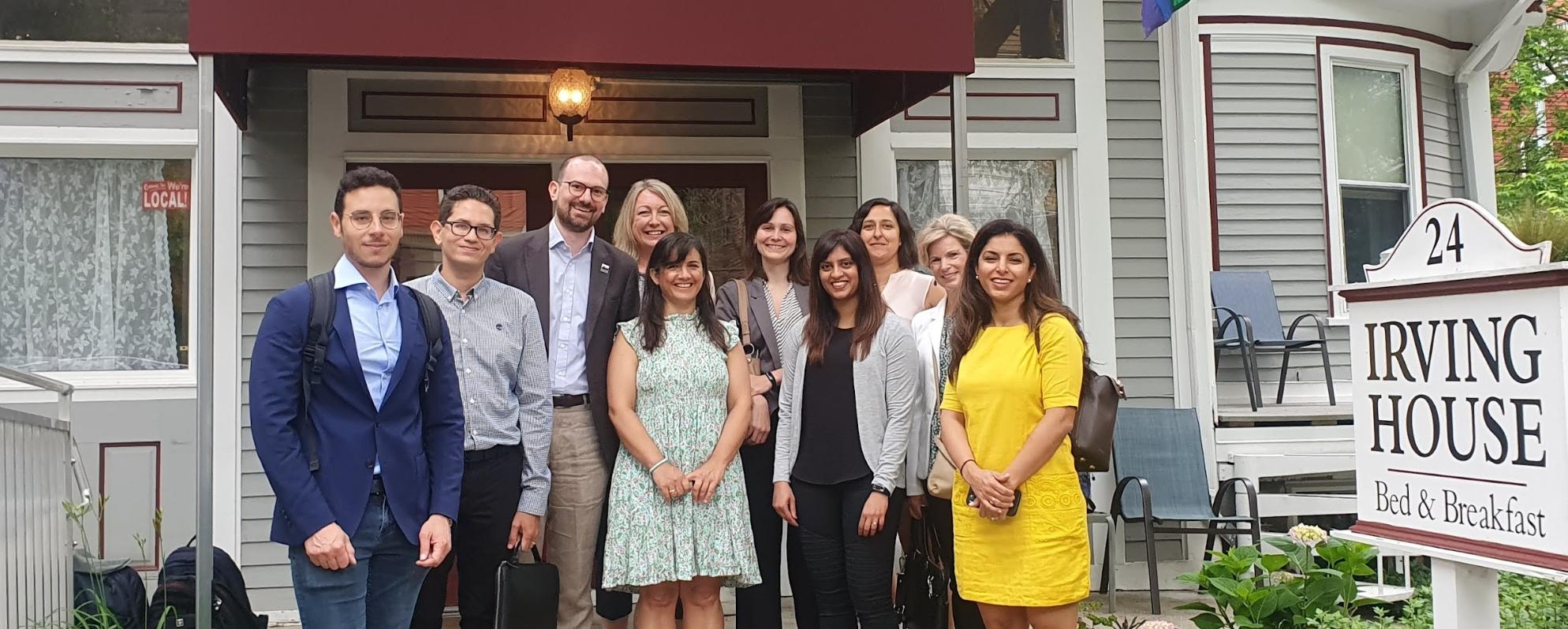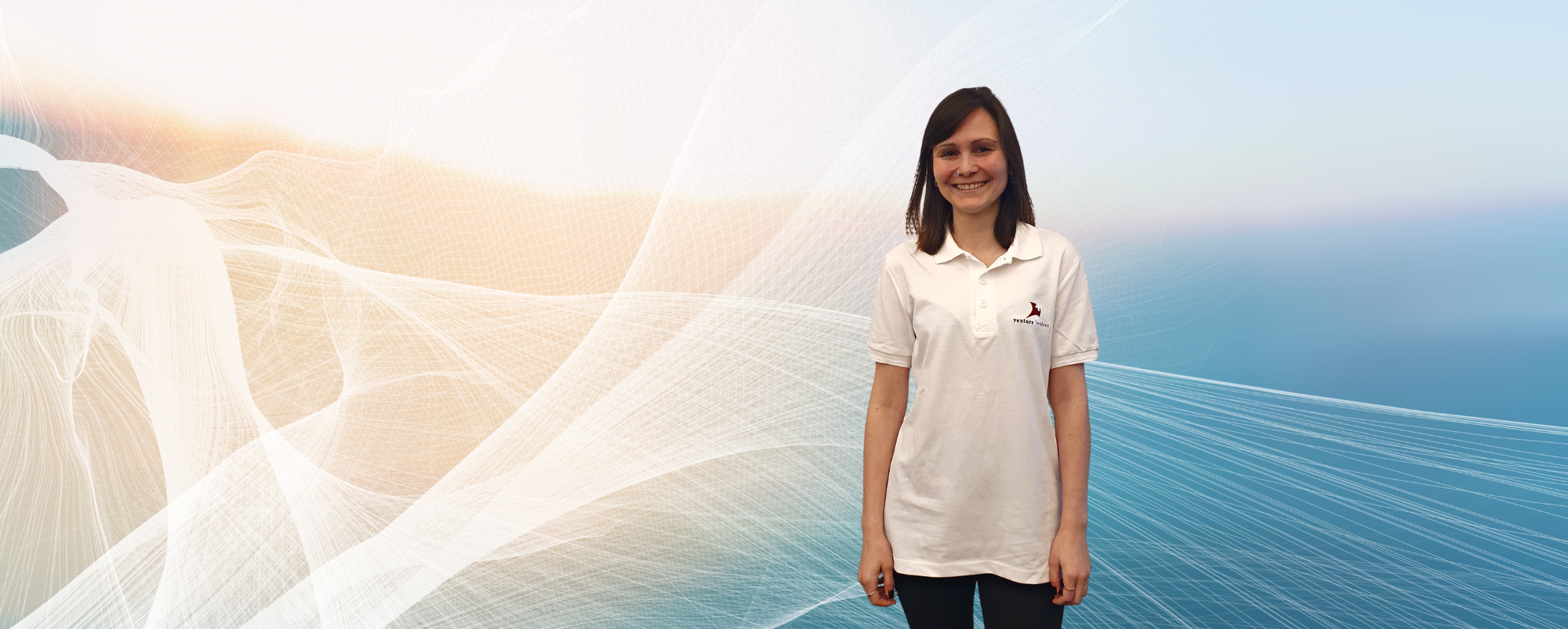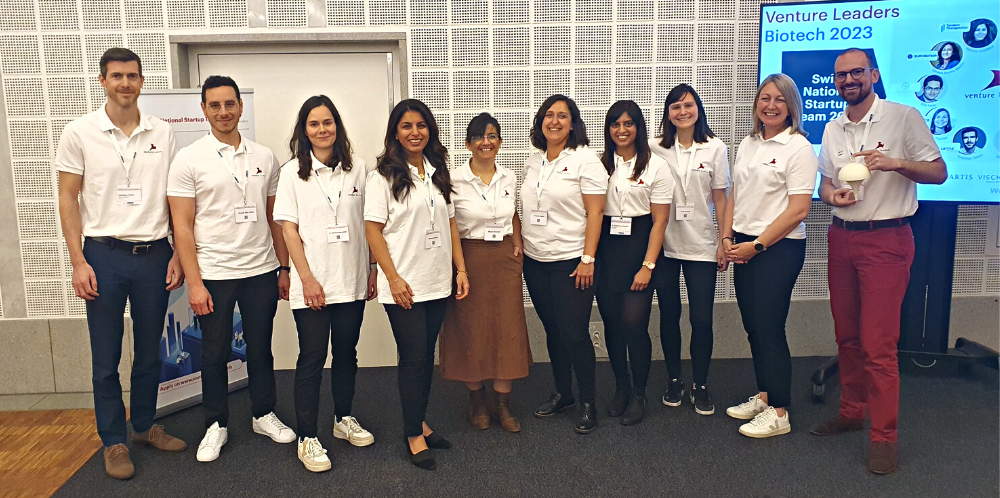Meet Zoë Johnson, CSO of Affivant Sciences. The startup, seeded by Roivant, develops novel bispecific tetravalent monoclonal antibodies in an effort to engage the innate immune system to fight cancer cells. The so-called Innate Cell Engagers (ICEs) are designed to target specific patient populations as powerful monotherapies and combination treatments. In June, Zoë will be join nine other biotech innovators on a business development and investor roadshow in Boston.

Name: Zoë Johnson
Location: Basel, Switzerland
Nationality: British
Graduated from: King's College, London, PhD, 2003
Job title: Chief Scientific Officer
Number of employees: 11
Money raised: USD 60 million USD
"We have a strong belief in the potential for our molecule to treat ovarian cancer patients who have very limited options once platinum resistance develops and we are eager to bring this molecule into clinical development as soon as possible."
Whom does your product or solution help, and how?
Platinum-based chemotherapy has been the standard of care for ovarian cancer for the past three decades. Although most patients respond to platinum-based treatment, the emergence of platinum resistance in recurrent ovarian cancer (PROC) is inevitable during the disease course. Outcomes for patients with platinum-resistant ovarian cancer are poor, and options remain limited, highlighting a substantial unmet need for new treatment options. Folate receptor alpha (FRα) has gained interest as a target in the antibody-drug conjugate (ADC) space, spurred by the approval of Elahere (Immunogen). However, limitations of ADCs include limited activity in lower target-expressing cancer cells and safety issues. Novel approaches to target FRa using different technology offer an alternative way to potentially treat PROC patients, as well as further indications.
What market are you addressing and what is the potential of your startup in that market?
There are unfortunately very limited options for ovarian cancer patients that relapse after platinum-based chemotherapy, and this indication has not shown good outcomes to T-cell-based immunotherapy. We are developing AFVT-2101 as a fast-to-market single agent in all-comers ovarian cancer, with a market potential of around USD 2 billion p.a. We also see the potential to augment the efficacy of standard of care, early-line checkpoint inhibitor regimens across multiple indications such as lung, kidney, and breast cancer with a market potential of around USD 15 billion p.a.
How did you come up with the idea for your startup?
Looking beyond T-cell-based immunotherapy for the treatment of cancer, we evaluated novel innate-cell engager platforms. We saw huge potential in using Affimed’s technology to generate a FRα targeting, CD16A enhanced immune cell engager (ICE) to target T-cell-deficient ovarian cancer. During preclinical development, we spotted the potential for this molecule to go beyond PROC, and are now expanding our clinical development plans to include so-called "hot" tumor types such as lung cancer, kidney cancer, and breast cancer.
How do you think the Venture Leaders roadshow will help you achieve your vision?
Developing immuno-oncology drugs from early stages is a financially intensive endeavor. In the current economic climate, raising series A funds is especially challenging. We have a strong belief in the potential for our molecule to treat ovarian cancer patients who have very limited options once platinum resistance develops and we are eager to bring this molecule into clinical development as soon as possible. Therefore, the opportunity that Venture Leaders Roadshow gives to reach US-based investors who could lead a syndicate to fund our Series A plans is invaluable to us. Furthermore, we would like to expand our business development outreach and look forward to networking with potential partners and increasing the visibility of our company and molecule.
What excites you most about your work right now?
My passion is turning early-stage ideas into molecules with drug-like properties, and then transitioning them into patient trials. I have already worked on a number of drug development programs that have been either successfully commercialized or are currently in clinical development. I am excited to see AFVT-2101 move into clinical trials and to see the early clinical data as well as, I hope, benefits to patients.
 Zoë Johnson presenting Affivant Sciences' solution at the Swiss Biotech Day 2023
Zoë Johnson presenting Affivant Sciences' solution at the Swiss Biotech Day 2023
How did you go about building your team?
We identified key roles that would support our ambitious timeline to take AFVT-2101 from lead identification to clinical development. We are fortunate that we have a rich source of talented and experienced drug developers in the Basel region. It is a testament to the exciting program we are working on that we managed to attract several key team members from the big pharma in the area.
"I have been fortunate in my career to have worked with excellent female leaders in pharma and biotech. Each one has taught me how to lead with compassion and openness."
What are your team's key achievements to date?
When we started Affivant, we set out a development timeline to hit IND readiness by Q2 2023. It is a great achievement that we have hit that timeline. We have also presented AFVT-2101 at two high-profile, international scientific conferences in the last six months, reflecting the wealth of high-quality data that we have generated in the early stages of our company's evolution.
Who inspires you and why?
I have been fortunate in my career to have worked with excellent female leaders in pharma and biotech. Each one has taught me how to lead with compassion and openness. From observing and in some cases being mentored by these women, I have learned that being strong does not have to equate with being uncompromising. As a result, I have developed a leadership style that I would describe as kind and firm. Having a team of inspirational females in my head means I frequently ask myself, "what would person x do?" or "how would person y handle this"; it is a useful tool to encourage a moment to pause, reflect and consider alternatives before taking action.
What is the best piece of advice you have ever received and from whom?
Self-belief is a powerful thing. At the start of my Affivant journey, a good friend of mine reminded me of a famous Henry Ford quote: “Whether you think you can or you think you can't – you're probably right." Too often, we set out to achieve something but don't believe we can do it. As a result, we don't even start. And we all know what happens if we don't start: there will be no success whatsoever. The stories we tell ourselves, in our head, shape not only what we do, but how we do it. Acknowledging that failure is a possible outcome, and shifting our mindset to not only accept it but to embrace it and learn from it when it happens, is a huge step on the path to ultimate success.
What is your favorite podcast and why?
The Huberman Lab podcast is released every Monday and discusses science and science-based tools for everyday life. Andrew Huberman, the host, is a professor of neurobiology at Stanford School of Medicine in California. I love this podcast as it is science-based, and each episode is thought-provoking and engaging. If you are interested in improving your overall health and well-being, this is the podcast for you. Fun fact, I met Prof Huberman when I was staying at a hotel in Boston last year and he was having breakfast on the table next to me, one of my favorite celebrity encounters!
What is your favorite book and why?
One of the most interesting and moving books I have read in the last few years is A Series of Catastrophes and Miracles: A true story of love, science and cancer written by Mary Elizabeth Williams. The author, a journalist and mother, was diagnosed with metastatic melanoma in her early 40s. At that time metastatic melanoma was pretty much a death sentence. Mary Elizabeth, being treated at MSK in New York, decided to take a chance on a clinical trial – a combination of ipilimumab (Yervoy) and MDX-1106 (now better known as nivolumab). This book is an excellent account of clinical trials from the patient's perspective, as well as the devastating effect that a cancer diagnosis has on family and friends.
ABOUT THE PROGRAM
The Venture Leaders Biotech 2023 were chosen from over 70 applications by a jury of investors and technology experts. The roadshow in Boston, the vibrant life science hub, provides a unique opportunity for entrepreneurs to accelerate their startups' expansion in the US while expanding their professional network and profiting from workshops with investors and industry leaders. This year's Venture Leaders Biotech program is organized by Venturelab in partnership with Swissnex Boston and supported by Debiopharm, Novartis, EY - Ernst & Young, VISCHER, EPFL, ETH Zurich, Hansjörg Wyss, and the Swiss Biotech Association.
Affivant Sciences GmbH: Developing novel innate immune engagers for cancer
While most immuno-oncology (IO) approaches are based on activation of cytotoxic T-cells, Affivant Sciences develops novel bispecific tetravalent monoclonal antibodies which engage cells from the inna... Read more













